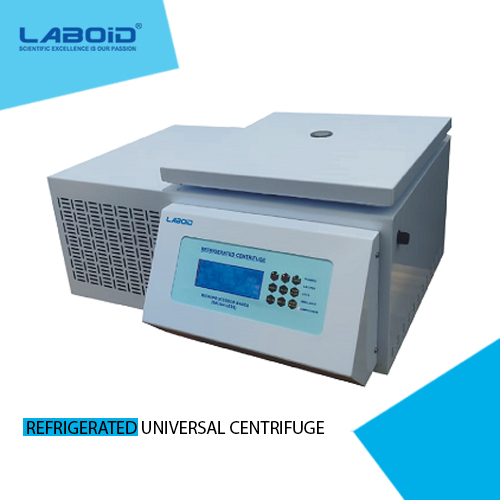Unleash the power of precision separation! Refrigerated centrifuges are vital tools across scientific & industrial fields, from biochem to food processing. Discover their applications! These specialized instruments leverage the principles of centrifugal force and temperature control to separate and isolate valuable materials within a sample. In this blog post, we’ll dive deep into the core principles that underpin the functionality of refrigerated centrifuges.
What is a Refrigerated Universal Centrifuge?
A refrigerated universal centrifuge is a type of centrifugal separator that incorporates a cooling system to precisely control the temperature of the sample during the separation process. This temperature control is a crucial feature that distinguishes refrigerated centrifuges from their non-refrigerated counterparts.
The primary purpose of incorporating a cooling system is to maintain the integrity and stability of temperature-sensitive samples. This is especially crucial for biological materials, enzymes or other compounds that can be adversely affected by heat generated during high-speed centrifugation. By keeping the sample at a desired low temperature, the refrigerated centrifuge helps to preserve the structural and functional properties of the materials being separated.
The Principle of Centrifugal Force
At the heart of a refrigerated centrifuge’s operation is the principle of centrifugal force. When a sample is placed in a centrifuge and the rotor is spun at high speeds, the sample experiences a strong outward force, known as centrifugal force. This force acts on the sample’s components, causing them to separate based on their relative densities.
Denser components, such as cell organelles, proteins, or other macromolecules, will migrate towards the outer edge of the centrifuge tube, while lighter components, such as water or buffer solutions, will remain closer to the center. Explore the concept of differential migration, the driving force behind centrifuge separation.
Temperature Control and Cooling Mechanisms
The key innovation of a refrigerated centrifuge is its ability to precisely control the temperature of the sample during the centrifugation process. To achieve precise temperature control, refrigerated centrifuges rely on a dedicated cooling system. This system typically includes the following components:
- Cooling Unit: The cooling unit, often a compressor-based refrigeration system, actively cools the air or fluid surrounding the centrifuge rotor, thereby lowering the temperature of the sample.
- Temperature Sensor: A temperature sensor, usually a thermistor or thermocouple, continuously monitors the temperature of the sample or the rotor environment, providing feedback to the control system.
- Temperature Control System: The temperature control system uses the feedback from the temperature sensor to automatically adjust the cooling unit’s operation, maintaining the desired sample temperature throughout the centrifugation process.
Ensure the integrity of your research with refrigerated centrifuges. Precise temperature control safeguards samples during high-speed separation, preserving structure, enzyme activity, and other vital properties.
Benefits of Using a Refrigerated Centrifuge
The controlled low-temperature environment offered by refrigerated centrifuges unlocks several benefits for scientists:
- Preserves Sample Integrity: Maintains the activity and structure of sensitive biological molecules like proteins and nucleic acids.
- Improves Separation Efficiency: Cold temperatures can enhance the separation of certain mixtures by increasing the viscosity of the suspending liquid.
- Reduces Thermal Degradation: Mitigates heat-induced damage to samples, crucial for maintaining accurate results.
- Versatile Applications: Supports a wide range of techniques in fields like molecular biology, cell biology, and biochemistry.
Applications of Refrigerated Centrifuges
Refrigerated centrifuges find a wide range of applications across various scientific and industrial fields, including:
- Biochemistry and Molecular Biology: These powerful tools enable the isolation and purification of essential biomolecules like proteins, DNA/RNA, and organelles, all while preserving their structural integrity and functionality.
- Cell and Tissue Culture: Refrigerated centrifuges are essential for the isolation and purification of cells, tissues, and cellular components in cell culture applications, where maintaining the viability and integrity of the samples is crucial.
- Food and Beverage Processing: Refrigerated centrifuges are a game-changer in the food and beverage industry. By separating and clarifying products like juices, oils and dairy items at precisely controlled temperatures they ensure optimal quality and preserve essential nutrients.
- Environmental Analysis: Environmental analysis depends on refrigerated centrifuges for separating & studying temperature-sensitive contaminants in soil, water, & sediments. Discover their crucial role in environmental protection.
- Pharmaceutical and Biotechnology: Refrigerated centrifuges are essential tools in biopharmaceutical industries for purifying & characterizing therapeutic proteins & vaccines. Learn how they ensure product quality.
Understanding refrigerated centrifugation is essential for scientists & researchers. Master these concepts to effectively use centrifuges for improved analysis, product quality, and research advancement.
This knowledge extends beyond just refrigerated centrifuges and can be applied to related equipment like ceramic hotplate magnetic stirrer. These stirrers offer precise temperature control and mixing capabilities and expanding the possibilities for efficient sample preparation and analysis.


